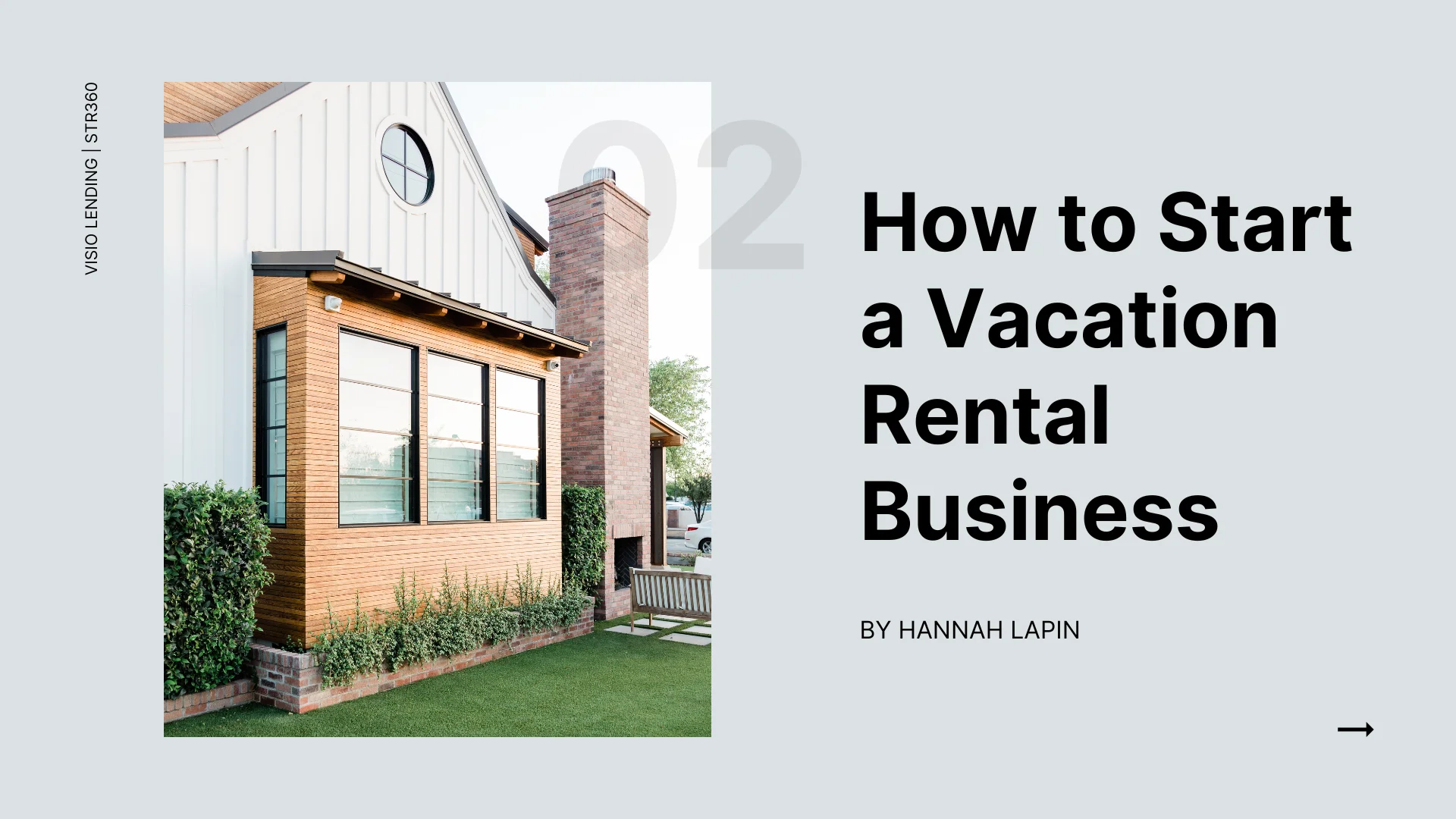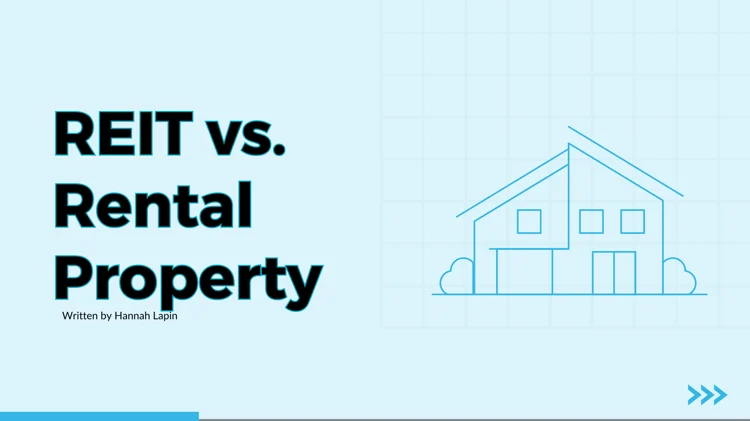If you’re wondering how to start a vacation rental business, you have good reason to do so — just in the US, the revenue is projected to reach $19.77 billion in 2024. [1]
A vacation rental business can offer passive income with proper planning and marketing. Read on to learn how to start your short-term rental business, including how to handle increasingly complex operations with multiple properties, how to choose the right location, the best funding options, and how to succeed as a property owner.
Decide on the Type of Vacation Rental Property
Investors have many vacation rental property types to choose from, including the following:
- Multi-family units – Multi-family units allow vacation rental owners to rent a property to multiple families at the same time. A multi-family vacation home rental typically has separate living areas that cater to multi-generational families or multiple groups of guests.
- Apartment rentals – An apartment can be a vacation rental. Apartment rentals typically are smaller and suited for one or two guests on vacation.
- Condos – Condos can also be vacation rentals. Some investors choose condo vacation rentals because of the shared amenities and minimal upkeep, with landscaping often included in the monthly fee.
- Single-family units – A single-family vacation rental caters to a single family. The home should have its own entrance, exit, yard, and parking spaces.
Choose a Location
Location is one of the most important factors when starting a vacation rental business. Here are a few key considerations that can help you narrow down your business plan in terms of location:
- Seasonality – Some areas are better suited to certain seasons. For example, a vacation rental in the south may be more in demand during the northern state’s colder temperatures. Some areas are also more in demand during school holiday breaks or summer vacations.
- Supply – The number of available vacation rentals in a specific area can affect how much you pay and how much you can charge. Limited supply means you’ll pay more but can also charge guests more.
- Demand – You’ll want to choose a vacation home rental in a location that’s currently in demand. Aspiring investors can review tourist rates and average prices when considering vacation rentals.
- Upkeep – Some locations may demand more property upkeep. For example, choosing a vacation rental in a southern state prone to hurricanes could mean more repairs. A vacation rental property in a part of the region with heavy snowstorms could mean more upkeep during the winter months.
Research the Local Laws
It’s also essential to understand the local city, county, and state laws when choosing a location for your vacation rental properties. Here are a few important considerations:
- Short-term rental laws – Some cities and counties set laws on short-term rentals, which may set a minimum night rental per guest. A vacation rental located in a county with seven-day-minimum rental laws could impact your marketing plans if you plan to rent the property out by the weekend.
- Long-term rental laws – Some cities and counties also have long-term rental laws, which may only allow vacation rental guests to rent for up to seven days before being considered a long-term resident.
- Inspection requirements – Most states have requirements for a thorough evaluation of the property’s safety.
- Registering a vacation rental business – Depending on state or county laws and the number of days you plan to rent out every year, you may need to register your vacation rental property as a short-term rental business.
- Required taxes and filing fees – Depending on where you choose to start your vacation rental business, you may be subject to extra taxes and filing fees.
Look for Properties for Sale
Once you narrow down your plan and have an idea of the best location, it’s time to begin shopping for properties. Before scheduling viewings with local real estate agents, keep the following considerations in mind:
- Size – Always consider the size of the potential property. Smaller homes may be suitable for a small family, and larger homes can be used for larger families.
- Home layout – The layout of the home may affect your rental business. Vacation properties tend to prioritize outdoor views and common living areas that allow guests to spend valuable time together.
- Extra fees – Some short-term vacation rentals may come with extra costs, like homeowners association (HOA) fees, which can impact your ability to offer a competitive price to guests.
- Amenities – Consider the amenities that can make vacation rentals profitable, such as a pool, outdoor cooking area, lounge area, or walk-in shower.
- Price – Price is one of the most important considerations when starting a vacation rental business. Make sure you choose short-term rentals within your budget that also warrant a good price in the existing market.
Consider Equipment and Appeal
- Fixtures – Many real estate investors update the fixtures in a home, including ceiling fans, hardware, window treatments, or lights. Minimally, you’ll want to go through the home to ensure each of these is safe for guests.
- Appliances – If your property purchase doesn’t come with appliances, you’ll need to purchase them. Short-term rental properties should provide guests with the basic appliances, including a stove, oven, refrigerator, washer, and dryer. You will need to repair and upkeep the equipment to maintain a successful real estate business.
- Furniture – You’ll also need furniture to start a vacation rental business. Be sure to fully furnish the home with a couch, chairs, dining room table, chairs, beds, and desks.
- Decorations – Unlike long-term rentals, guests expect festive or themed decorations when renting a vacation property. You’ll likely notice more vacation rental success with a nicely decorated unit.
- Household needs – Also, unlike with a long-term rental property, you’ll need to supply your vacation guests with household needs. This includes plates, cups, kitchenware, dish soap, hand soap, and toilet paper. Guests expect the vacation rental owner to supply all of these necessities.
Determine Your Ideal Guest
Pinpointing your ideal guest before entering the short-term rental business can help you narrow down your marketing efforts. Determine who your ideal guest is for your short rental with the following considerations:
- Family size – Family size affects the size of property you’ll need. Investing in a small condo may mean your ideal guest is a couple or small family.
- Age – Considering the target age of your ideal guest can help you choose designs and home features. You can also consider accessibility for small children or older guests.
- Preferences – Some vacation rental businesses cater their properties to travelers’ preferences. A vacation rental that’s part of a homeowner’s association can provide guests with access to a pool, whereas a single-family home can give some families the privacy they prefer.
- Vacation intent – Consider the traveler type you want to target. For example, you might choose a condo with a balcony for couples or a home across the street from a beach for beach-goers.
Define the Services You’ll Provide
Vacation rental business owners can be as involved or hands-off as they prefer. However, evaluating and listing the services you’ll provide ahead of time can help maintain clear guest expectations. It can also help you create a realistic vacation rental business budget to predict costs and earnings. Don’t forget about the following services:
- Cleaning – A vacation rental business typically requires that you manage all cleaning for short-term rentals. Guests expect the property to be clean when they arrive, and in some cases, you have less than 24 hours to prepare the property for the next guest.
- Repairs – A real estate business also requires that you manage all repairs timely. Most guests expect to be able to contact the vacation rental management company if they need immediate repairs.
- Transportation – You may or may not offer airport transportation with your vacation rental price. If other vacation rentals are doing so in the area, you should consider it.
- Travel guidance – Some real estate investors or property management companies offer free travel guidance included with the rental rate.
Determine Pricing
Making a pricing list, including expenses, repairs, and ongoing costs, can help you prepare for fluctuating costs and set a fair and profitable rate. Make sure you consider the following when calculating your investment property rate:
- Repairs – Make sure you factor in any expected repairs you’re likely to make on the investment property.
- Cleaning costs – Consider how much you’ll need to pay the cleaning company for each guest. Be sure to also include business expenses for cleaning products and the eventual wear down of things like sheets, furniture, and carpeting.
- Competition – Consider what other private properties are charging their guests in your area. If multiple properties are available for a lower price than what you’re charging, you may find it challenging to make your vacation rental business succeed.
- Demand – Demand should also drive pricing. This also means you may need to adjust your pricing throughout the season so you don’t lose money. For example, beach houses earn more in the summer and less in the winter. Most tourist-heavy locations have fluctuating demand between seasons.
- Expenses – Don’t forget to include all your expenses when calculating the right price. Don’t forget about the cost of a property manager, repairs, product replacement, cleaning fees, and taxes.
Choose a Business Name
Choosing a business name is a crucial part of starting any business, including a vacation rental one. Choose the best business name with the following steps:
-
- Know your state’s naming rules – Some states have guidelines that may limit some business names. Make sure you check that your own business name is available and allowed before publishing it anywhere.
- Research existing business names – Research your competitors to avoid naming your business something too similar to theirs.
- Keep it short and sweet – A good name is short and easy to remember, helping customers, contractors, and everyone else in the vacation rental industry remember your business name.
- Check website and social media availability – Make sure the website domain and social media tags are available for your intended name.
- Think about it for a while – Give yourself time to think about the name before settling on it and registering it with the state.
Write a Business Plan
A business plan outlines how to plan to make rental income through your short-term rental business and how long it will take to recoup costs. A thorough vacation rental property business plan should include the following parts:
- Business goals – Getting your vacation rental business started requires a consideration of your business goals. Be as specific as possible with your goals and include a timeline of when you intend to reach each one.
- Executive summary – An executive summary lists your professional experience and how you plan to succeed as a real estate investor.
- Management structure – Outline the management structure of your business venture. Include who will be involved and the role they’ll play in your real estate business plan.
- Target customer – List your target customer in your vacation rental business plan, including all key demographics and how you plan to reach them.
- Competitive analysis – A comprehensive business plan should also include a competitive analysis of your competitors. Include information on how your business model will help you break into the market.
- Financial plan – The financial plan is a crucial part. Determine how you plan to make money and at what point the business will become profitable. This section should also include how you plan to obtain financing.
Decide on the Business Structure
Some investors choose to go it alone when they start a vacation rental, and others may rely on the professional services of a property management company. Consider the following:
- Time available – If you don’t have a lot of extra time available, you may need property managers to help with your vacation rental business.
- Professional expertise – Starting a vacation rental business can be a learning opportunity. But, in the meantime, if you have limited experience, you may find value in working with a property management company to help control operating expenses while you enjoy passive income.
- Budget – Property managers charge a monthly fee, but they may also help you reduce repair and cleaning costs. Consider how extra help can fit in with your business strategy.
- Number of properties – If you have multiple vacation rental properties, you may need assistance in tasks like property listing, managing booking fees, and ensuring each guest receives quality service.
Pinpointing your ideal guest before entering the short-term rental business can help you narrow down your marketing efforts. Determine who your ideal guest is for your short rental with the following considerations:
Get Financing for Your Vacation Rentals
Obtaining financing is an integral part of starting a vacation rental business. Vacation rental property owners have a few options for financing, including:
- Savings – If you have sufficient savings available, you may be able to use it to acquire your first vacation rental property.
- Conventional mortgage – A conventional mortgage may be an option for some aspiring investors with good credit, sufficient income, and low debt.
- Cash-out refinance – A cash-out refinance loan allows you to borrow against your existing home’s equity to cover the start-up costs of starting a vacation rental business.
- Specialized vacation rental loans – Our vacation investment property loan is based on property cash flow and borrower credit, and it also works for self-employed investors.
- Debt-service coverage ratio (DSCR) loan – DSCR loans are an excellent option for aspiring real estate vacation rental business owners.
Get Insurance
Insurance is a must when starting a vacation rental business. Make sure you’re protecting yourself and your vacation rental business with the following insurance policies:
- Landlord protection – Also known as vacation rental insurance, this policy covers the home and structure of the home. Regular homeowner’s insurance will not work on a rental property.
- Business insurance – Some investors may choose to carry a separate business insurance policy. Business insurance costs vary depending on the home’s location and policy size.
Sort the Administrative Work
Starting a vacation rental business requires the completion of some paperwork, including the following:
- EIN – An EIN or Federal Tax Identification Number is necessary for filing taxes with the federal government.
- Rental license – You will need to register your short-term rental with your city and county.
- Business bank account – It’s advisable to have a business bank account to avoid mingling money between personal and business use.
- LLC – Many investors register their business as a Limited Liability Company (LLC), which limits your personal liability.
Hire Employees
Whether you have one or multiple vacation rental properties, you may rely on employees to help with the day-to-day operations. A few key employees to consider include:
- Property manager – A property manager manages the day-to-day of your property.
- Tax professional – A tax professional ensures you’re following all state and federal tax rules.
- Administrative assistant – An administrative assistant can help to manage bookings and oversee guest satisfaction.
- Repairman – A repairman handles all guest needs related to repairs and renovations.
- Housekeeper – A housekeeper cleans the property in between guests.
Establish a Marketing Strategy
Marketing is a must for a successful vacation rental business. A few excellent ways to market your short-term rental business include the following:
- Airbnb – Some businesses market their properties on third-party sites, like Airbnb. These sites can get you more bookings by expanding your reach.
- Local marketing – Local marketing may be helpful in more remote locations or areas with ample attractions.
- Word of mouth – Some property owners rely on word of mouth of satisfied guests sharing their outstanding photos or experiences with family and friends.
- Digital marketing – Digital marketing can help those with a property in a flourishing tourist scene reach more customers.
Manage and Maintain Your Vacation Property Business
Ongoing management and maintenance are important aspects of any business, including vacation rental businesses. Don’t forget to add the following tasks to ensure steady vacation rental income:
- Ongoing repairs and maintenance – The more properties you have, the more facilities and repairs you may require. It’s crucial to maintain the property long-term for ongoing success.
- Continued administrative filings – Most cities and states require annual filings. A vacation rental software solution can make keeping up with these tasks easier.
- Understanding tenant needs – Continually reviewing and understanding tenant needs can help you expand and do well in the vacation rental business.
- Reevaluating funding – It’s always a good idea to continue reevaluating financing to ensure you’re getting the best rates and avoiding expensive fees.
References: [1] Statista






